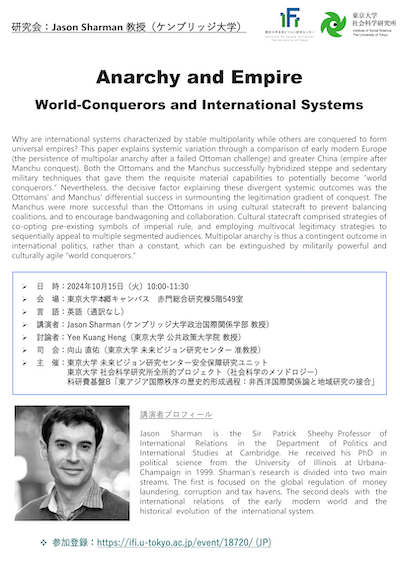第34回ワークショップ アナキーと帝国:世界征服者と国際システム
講演者:Jason Sharman [ケンブリッジ大学政治国際関係学部]
日時:2024年10月15日(火)10:00~11:30
場所:東京大学本郷キャンパス赤門総合研究棟5階 センター会議室(549号室)
http://www.u-tokyo.ac.jp/campusmap/cam01_08_02_j.html
言語:英語(同時通訳なし)
開催形式:対面
対象:一般公開
討論者:Yee Kuang Heng(東京大学公共政策大学院)
司会:向山直佑(東京大学未来ビジョン研究センター)
報告要旨:Why are some international systems characterized by stable multipolarity while others are conquered to form universal empires? This paper explains systemic variation through a comparison of early modern Europe (the persistence of multipolar anarchy after a failed Ottoman challenge) and greater China (empire after Manchu conquest). Both the Ottomans and the Manchus successfully hybridized steppe and sedentary military techniques that gave them the requisite material capabilities to potentially become "world conquerors." Nevertheless, the decisive factor explaining these divergent systemic outcomes was the Ottomans' and Manchus' differential success in surmounting the legitimation gradient of conquest. The Manchus were more successful than the Ottomans in using cultural statecraft to prevent balancing coalitions, and to encourage bandwagoning and collaboration. Cultural statecraft comprised strategies of co-opting pre-existing symbols of imperial rule, and employing multivocal legitimacy strategies to sequentially appeal to multiple segmented audiences. Multipolar anarchy is thus a contingent outcome in international politics, rather than a constant, which can be extinguished by militarily powerful and culturally agile "world conquerors."

